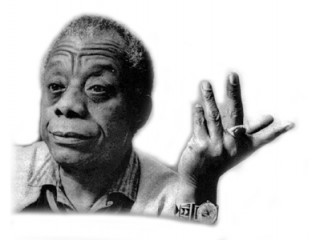
James Baldwin biography
Date of birth : 1924-08-02
Date of death : 1987-11-30
Birthplace : New York, New York, USA
Nationality : African-American
Category : Famous Figures
Last modified : 2010-07-30
Credited as : Author and playwright, leader of the civil rights movement, novelist
1 votes so far
Early life
James Arthur Baldwin, the son of Berdis Jones Baldwin and the stepson of David Baldwin, was born in Harlem, New York City, on August 2, 1924. He was the oldest of nine children and from an early age loved to read. His father was a preacher in the Pentecostal church, and at the age of fourteen Baldwin also became a preacher. At eighteen he graduated from DeWitt Clinton High School, where he had written for a magazine put out by the school. Baldwin then realized that he wanted to write for a living.
In 1944 Baldwin met another writer named Richard Wright (19081960), who helped Baldwin secure a fellowship (a writing award) that provided him with enough money to devote all of his time to literature. By 1948 Baldwin had decided that he could get more writing done in a place where there was less prejudice, and he went to live and work in Europe with money from another fellowship. While overseas Baldwin completed the books Go Tell It on the Mountain (1953), Notes of a Native Son (1955), and Giovanni's Room (1956).
Spokesperson for civil rights movement
Returning to the United States after nine years overseas, Baldwin became known as the leading spokesperson among writers for the civil rights of African Americans. He gave popular lectures on the subject, and he quickly discovered that social conditions for African Americans had become even worse while he was abroad. As the 1960s beganand violence in the South increasedBaldwin grew increasingly angry. He responded with three powerful books of essays: Nobody Knows My Name (1961); The Fire Next Time (1963), in which he predicts future outbursts of black anger; and More Notes of a Native Son. These works were accompanied by Another Country (1962), his third novel. Going to Meet the Man (1965) is a group of short stories from the same period. During this time Baldwin's descriptions of Richard Avedon's photography were published under the title Nothing Personal (1964). Four years later came another novel, Tell Me How Long the Train's Been Gone.
In addition, the mid-1960s saw Baldwin's two published plays produced on Broadway. The Amen Corner, first staged in Washington, D.C., in 1955, was presented at New York City's Ethel Barrymore Theatre in April 1965. Similar in tone to Go Tell It on the Mountain, it describes the strong religious feeling of the Pentecostal church. Blues for Mr. Charlie, which premiered at Broadway's ANTA Theatre in April 1964, is based on the case of Emmett Till, a fourteen-year-old African American from Chicago who was murdered by white people in Mississippi in 1955.
The assassinations of three of Baldwin's friendscivil rights marcher Medgar Evers (19261963), the Reverend Martin Luther King, Jr. (19291968), and the black Muslim leader Malcolm X (19251965)destroyed any hopes Baldwin had that problems between the races would be solved in the United States, and he returned to France in the early 1970s. His later works of fiction include If Beale Street Could Talk (1974) and Just Above My Head (1979). Nonfiction writings of this period include: No Name in the Street (1972); The Devil Finds Work (1976), an examination of African Americans in the movie industry; and The Evidence of Things Not Seen (1985), a discussion of issues of race surrounding the child murders in Atlanta, Georgia, in 1979 and 1980. A volume of poetry, Jimmy's Blues, was issued in 1985.
Literary achievement
Baldwin's greatest achievement as a writer was his ability to address American race relations by discussing the effects of racism (unequal treatment based on race) on the mind. In his essays and fiction he considered the point of view of both the offender and the victim. He suggested that all people, not just one group of people, suffer in a racist climate. Baldwin's fiction and plays also explore the burdens society places on individuals. Two of his best-known works, the novel Go Tell It on the Mountain and the play The Amen Corner, were inspired by his years with the Pentecostal church in Harlem. In Go Tell It on the Mountain, for instance, a teenage boy struggles with a strict stepfather and experiences a religious awakening. Love in all of its forms became a key ingredient in Baldwin's writing. Later Baldwin novels deal honestly with homosexuality (sexual desire for members of the same sex) and love affairs between members of different races.
Baldwin's writing is noted for its beauty and power. His language seems purposely chosen to shock and shake the reader into a concerned state of action. His major themes are repeated: the terrible pull of love and hate between black and white Americans; the conflicts between guilt or shame and sexual freedom; the gift of sharing and extending love; and the charm of goodness versus evil. He describes the rewards of artistic achievement among the problems of modern life, including racism, industrialism (the influence of large corporations on everyday life), materialism (the pursuit of material wealth above all else), and a global power struggle. Everything that lessens or harms the human spirit is strongly attacked.
Final years
Baldwin remained overseas much of the last fifteen years of his life, but he never gave up his American citizenship. The citizens of France came to consider Baldwin one of their own, and in 1986 he was given one of the country's highest honors when he was named Commander of the Legion of Honor. He died of stomach cancer on November 30, 1987, in Saint-Paul-de-Vance, France, but he was buried in Harlem. One of his last works to see publication during his lifetime was a collection of essays called The Price of the Ticket: Collected Nonfiction, 19481985.
















